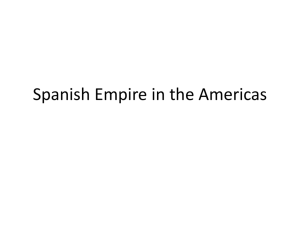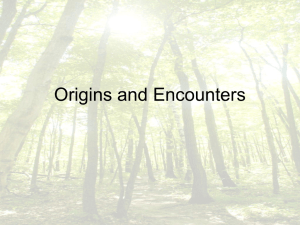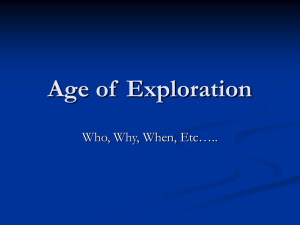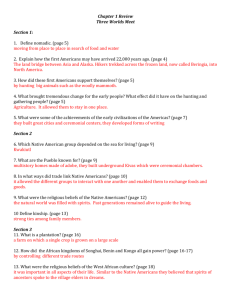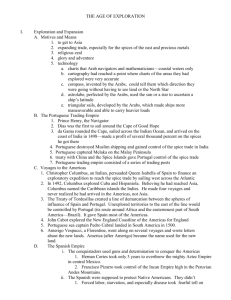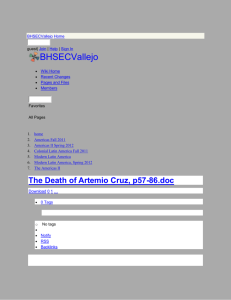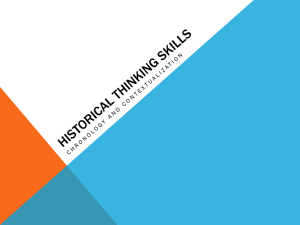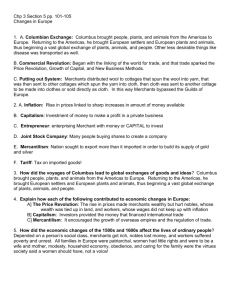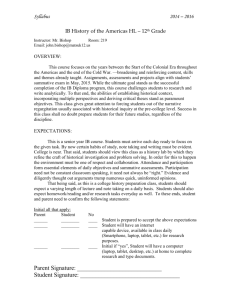The Age of Exploration 1500-1800
advertisement
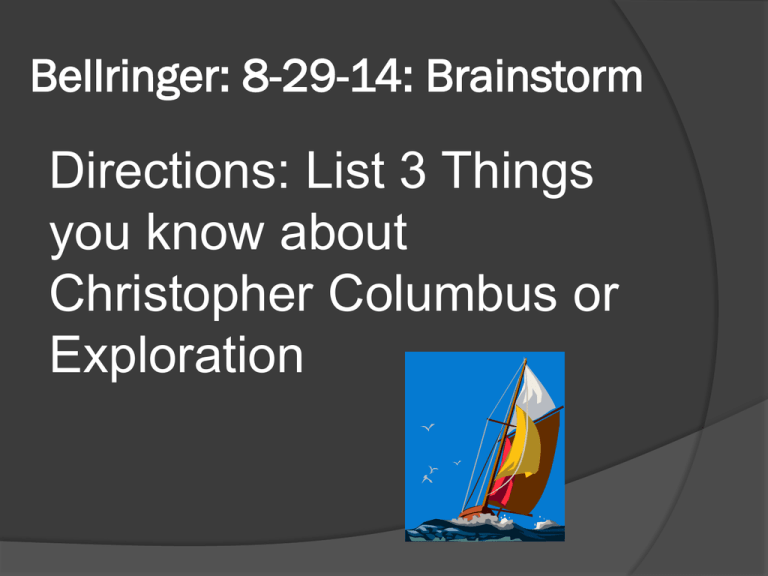
Bellringer: 8-29-14: Brainstorm Directions: List 3 Things you know about Christopher Columbus or Exploration Planner: 8-29-14 Finish Columbus Journal Writing Ch. 6 Test 9/12 Ch. 6 Quiz 9/11 Label all Continents and Oceans: pg. RA4 and RA5 The Age of Exploration 1500-1800 Exploration and Expansion Exploration and Expansion 1. Began exploring because of trade. (Spices, Precious Metals) 2. Religious Zeal (passion)-wanted to share religion with the natives 3. Grandeur, Glory and Spirit of Adventure 3. “God, Glory and Gold” Portugal Portuguese Trading Empire Leader in European Exploration Henry the Navigator, School for Navigation, 1419 Sailing around Africa to Asia, looking for gold Bartholomeu Dias- Cape of Good Hope, Africa Vasco de Gama- India Developed spice trading posts throughout Asia School of Navigation today, Lisbon, Portugal Voyages to the Americas Spanish decided to sail across the Atlantic to get to Asia, landed in the Americas instead. Christopher Columbus Sailed west to get to Asia, instead of going around Africa Sponsored by King Ferdinand and Queen Isabella of Spain, he had to beg them for $ October, 1492, he reached Cuba After 4 trips, reached all major islands of the Caribbean and Honduras in Central America, called the Indies. Christopher Columbus Journal Writing: pg. 196 Christopher ColumbusDirections: Read the selection on pg. 196 Journal on your thoughts of Columbus: Here is a starting point: Choose a side Was he a hero who ushered in economic well being throughout the world? Was he a prime mover in the destruction of the people and culture of the Americas? Bellringer: 9-2-14 1.Explain what God, Glory and Gold means.- pg. 190 2. What was the purpose of Navigation Schools? 3. How did Columbus really feel about the Natives? Planner: 9-2-14 Ch. 6 Test 9/12 Ch. 6 Quiz 9/11 Continent Quiz- 9/4 Treaty of Tordesillas, 1494 Spain and Portugal both exploring new lands and competing with each other for these lands Agreed to draw a line of demarcationimagery line that divided the land. The line ran N to S Spain got all lands W of the line, the Americas Portugal got all lands E of the line, Africa/Asia Henry the Navigator Bartholomeu Dias Vasco da Gama Christopher Columbus King Ferdinand Queen Isabella John Cabot Amerigo Vespucci Ferdinand Magellan Hernan Cortes Francisco Pizarro Portugal Founded School of Navigation Race to Americas Others heard about Columbus and were racing to get to the Americas to claim land John Cabot-England Amerigo Vespucci(Italian)was named after him Ferdinand Magellan(Portuguese) 1st to circle the world The New World These lands were called the “New World” Millions of people were already living in the New World, the Europeans saw opportunities for conquests. The Spanish Empire Conquistadors- Spanish conquerors Individuals whose guns and determination brought them incredible success. Hernan Cortezoverthrew Aztec Empire in 3 yrs. Francisco Pizarrotook control over the Incas In 30 years, the western part of Latin America had been taken over Aztecs Incas Bellringer: 9-3-14: Vocabulary Review Choose an appropriate vocabulary word. 1. _____ is the difference in value between nation imports and what it exports over time. 2. ______Spanish Conquerors 3. ______economic thought, set of principles 4. ______ A settlement of people living in a new territory- linked with a parent government control Planner: 9-3-14 Ch. 6 Test 9/12 Ch. 6 Quiz 9/11 Continent Quiz-Tomorrow!!!!!- Spelling Counts Explorer Sheet: Directions: Get out your Explorer Sheet and use your book to fill in the rest of the explorers, what country they came from and what did they do. Bartholomeu Dias- Portugal- southern tip of Africa Native Laborers Queen Isabella granted the Spanish encomienda Encomienda- the right use Native Americans as laborers- (Vocab Word) The Spanish were suppose to protect the Indians, but didn’t since they were so far away. Indians put to work on sugar plantations (gold, silver) Declining Population Forced Labor Starvation Disease- no immune Smallpox, measles, typhus Economic Impact and Competition Colonists established plantations that produced goods and sent them back to Europe for economic purposes- called the Columbian Exchange America products sent to Europe European products sent to Americas Exchange of plants and animals Trade, Colonies and Mercantilism Nations began establishing coloniessettlement of people living in a certain area This time known as Commercial Revolution Mercantilism-principles that dominated economic thought in 17th century(Vocab Word) Bellringer: 9-4-14- pg. 198 What color does the red box represent? 2. What color does the purple box represent? 3. What ocean is located between the Americas and Europe/Africa? 4. People going to Africa were coming from what continent? 5. People leaving Africa were going to what continent? 1. Planner: 9-4-14 Ch. 6 Test 9/12 Ch. 6 Quiz 9/11 Continent Quiz-TODAY Continent Quiz Directions: Use a ½ sheet of paper Answers: must look exactly like this Antarctica 2. Africa 3. Indian Ocean 4. Arctic Ocean 5. South America 6. Pacific Ocean 7. North America 8. Atlantic Ocean 9. Asia 1. 10. Australia 11. Europe Growth of the Slave Trade Triangular TradeNew World Economy (Europe, Africa, Americas) Europe to Africa- goods, guns, cloth Africa to AmericasSlaves Americas to Europetobacco, sugar, cotton The Slave Trade Slavery had been practiced for ancient times India, Rome, Greece 1550’s slaves were taken to Portugal- mostly domestic servants 1600’s – plantations for sugar cane in Brazil and the Caribbean demanded huge laborers Native Americans had died out, so African slaves where shipped to Brazil and the Caribbean Sources of Slaves Beginning of the 15th century, African slaves were prisoners of war Europeans started buying these prisoners from African merchants African headhunters collected slaves near the coast then moved inland Some African slave companies complained, but they still needed to get paid Middle Passage Around 10 million African Slaves were brought to the Americas btw 1600-1900 Many died on the way to the Americas b/c of the Middle Passage, or died from disease when they got to the Americas Pictures # 1 Picture 2 Picture 3 Picture 4 Picture 5 Picture 6 Slavery Primary Document We are going to dissect a primary document written by a doctor who was on board of a slave ship. What is a Primary Document? What is a Secondary Document? Bellringer: 9-5-14 Directions: Draw the last 5 Vocabulary Squares box on your paper. 1. Write the word 2. Definition 3. Make up a sentence using that word. 4. Synonyms 5. Image PG. 198, 203, 204 Planner: 9-5-14 Ch. 6 Test 9/12 Ch. 6 Quiz 9/11 Effects of the Slave Trade War fare increased African population decreased Group Activity: Directions: 1. You and a partner are to read Traditional Political Systems on pg. 199 and Foreign Influences on pg. 200 2. You need to take your own jot notes on each. 3. We will do the first together as a group, then you are on your own Traditional Political Systems Bellringer: 9-8-14: Review Who died thinking they reached a new way to India, but really landed in the Americas? 2. Who is Afonso de Albuquerque?-pg. 192 3. Mercantilists believed that a nation would proper if they had a lot of?- pg. 195 4. The African society of ____ was changed from a brilliant society to a active slave trading area. – pg. 200 1. Planner: 9-8-14 Ch. 6 Test 9/12 Ch. 6 Quiz 9/11 Southeast Asia-Spice Trade Emerging Mainland States 1500 SE Asia stable kingdoms were being formed European influence in Southeast Asia was stronger in the Malay Peninsula and Indonesian Archipelago because they had no strong central governments Area mostly- Islamic faith The Arrival of Europeans- pg. 203-203 Spice Area known to Europeans as Moluccas The Dutch came in over took the Portuguese trading posts- mostly islands, coastal regions The Dutch tried to dominate the clove trade by limiting cultivation of crops to one island and forcing others to stop the growing and trade of the spice. European Declining Impact in Spice Trade: Europeans had less impact on the mainland states of Southeast Asia because the mainland states were able to unite and drive Europeans out. Post Card Activity Directions: you are to create a postcard about your adventures as an Explorer, European Spice Trader. You need: 1. A picture of what its like where you are on the back 2. An address back to your country and a person you are sending too 3. A description of what you did and how it looks where you are Bellringer: 9-9-14: Review Originally, African slaves were brought to the Americas to work on what type of plantations? 2. What does bureaucracy mean? – pg. 204 3. What does mainland states mean? – pg. 203 4. What are the Moluccas?- pg. 202 5. Who is the King and Queen of Spain who gave money to Columbus? 1. Planner: 9-9-14 Ch. 6 Test 9/12 Ch. 6 Quiz 9/11 Study Guide Time Directions: You and a partner may work on defining, answering, or explaining items from the Study Guide that deal with all sections 1. Countries leading Exploration 2. African governments called? 3. Moluccas 4. African Society of Benin Guided Reading for 6.3 Word Scrambler You and the same partner work on the Guided Reading for 6.3 and the Word Scrambler This is to be handed in for a grade 3-2-1: put in box when you leave 3- Things you learned about this chapter 2- Questions you might have still 1- Your favorite thing we have discussed Bellringer: 9-10-14: Section 6.3 and 6.4 Review 1. 2. 3. 4. African kingdoms showed their unity by giving their king what? – pg. 199 Why did Europe not have a big impact on the mainland states? – pg. 203 What was dominant religion in Asia from 1500-1800?- pg. 202 Why did European rulers and merchants want control of SE Asia? – pg. 201 Planner: 9-10-14 Ch. 6 Test 9/12 Ch. 6 Quiz 9/11 Bio Day: Directions: You and a partner are to select an additional info. Packet on one of the following topics: You need to read it and create a instructional aid in order to present this information: Some of you will be pulled to show the class: 1. Columbus 4. Hernan Cortes 2. Elmina’s Castle 5. Amistead 3. Pirates 6. Native Americas Bellringer: 9-11-14: Vocabulary 1. __________large agricultural estates (farms) 2. _______the journey the African slaves took to get to the Amercias 3. ________area that is connected to the mass continent, not a peninsula or island 4. ______a body of nonelective government officials 5. ________3 continent route between Europe, Africa and the Americas Exchange Planner: 9-11-14 Ch. 6 Test Tomorrow!!!! 911 News Day CNN STUDENT NEWS CHANNEL ONE NEWS Age of Exploration Jeopardy Review Bellringer: 9-12-14: Use study guide 1. Spanish conquerors of the Americas 2. the right to use Native Americans as slaves 3. settlement in a new territory linked to a parent country by trade 4. economic theory of the 17th century, set of princples 5. difference in value between exports and imports over time Planner : 9-12-14 Ch. 7.1 Vocab Squares
